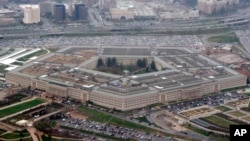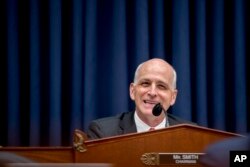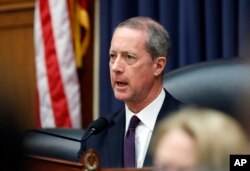Two of the lawmakers responsible for Congressional oversight of the U.S. military want to see more openness, including more on-camera briefings from top officials.
Both House Armed Services Committee Chairman, Democrat Rep. Adam Smith, and Ranking Member, Republican Rep. Mac Thornberry, worry the increasing lack of transparency could foster additional distrust and said this week the trend needs to be reversed.
"This administration has sort of erred on the side of being not transparent," Smith told reporters Monday when asked about a provision in the committee's version of the proposed defense spending bill that calls for more intense oversight.
"We just want to know what they're [the military] up to in a timely manner," he said, adding, "I don't entirely trust the Trump administration's approach. ... It's like, 'If the facts don't match, we'll just change them.'"
While less critical of the administration, Thornberry told reporters Tuesday the Defense Department needs to do a better job.
"I think probably the Pentagon has tilted a little too much toward not releasing information," he said.
Thornberry said that engagement includes a need for more on-camera briefings from top Pentagon spokespeople — something defense officials have not done in more than a year.
"Yeah, I think they should," Thornberry said. "National security is the most important thing the federal government does. We need to continually engage with the public."
Friction with media
The White House did not respond to a VOA request for comment on the criticism, but the Pentagon defended its record, arguing it provides the public and the media with plenty of opportunities to ask questions and get information.
Still, the lack of on-camera briefings has sparked friction between defense officials and reporters covering the Pentagon.
Asked about the lack of briefings back in April, Defense Department spokesman Charles Summers said, "I can't tell you why it's been so long, but I know that we will go on camera and when we are ready to do that I will let you know."
Other officials point to the Defense Department's long history of engaging with the media and of providing access to top officials.
"The Pentagon remains one of the only government agencies that allows nearly unrestricted access to the building for hundreds of credentialed journalists," Pentagon spokesman Tom Crosson told ABC News last month.
But journalists are not the only ones who have expressed concern.
Classifying information
Independent watchdogs, like the Special Inspector General for Afghanistan Reconstruction, also have accused the Pentagon of increasingly classifying information that was once available to the public.
"They've assured me they want to be transparent," Smith said of his recent conversations with Pentagon officials, though he added he has yet to see any indication they will be more forthcoming on specific issues, like U.S. efforts in Syria or Afghanistan.
Thornberry said he understands defense officials are, at times, in a difficult a position.
"It is one of the big challenges we face to have as much openness and transparency as possible without damaging the mission, without helping the adversaries," Thornberry said, while notingthat outreach is an "important part of leadership."
"You have got to engage with the public."


























